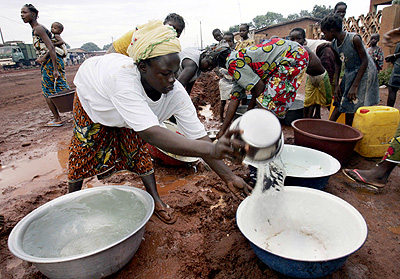
The water conservation skills of ethnic African communities once considered to be primitive are now being increasingly seen as an asset to the Aid donors. A Ugandan Government release revealed that by encouraging the water management methods of local communities aid donors to Africa would save millions of dollars out of $4 billion a year they spend on water supplies.
Maria Mutagamba, Ugandan Minister of Water and Environment, speaking at a U.N.-sponsored water symposium, said that the water management and technicians engaged in it consume about 35% of total developmental aid to Africa. By employing qualified Africans and encouraging ethnic water conservation system in place of foreign experts, the nations of Africa can save a significant sum and deploy it to alleviate poverty and health hazards.
Water scarcity and water-borne diseases such as diarrhea, parasites and dehydration are most important problems Africa is facing today. An average of 6,000 people die every day due to these factors. The UNESCO-IHE Institute of Water Education symposium was organized in Delft to consider and overcome this problem of the Africans.
About 1 billion people worldwide are without access to safe drinking water. Around the same number of people have no access to proper sanitation facility. Most of these underprivileged belong to the continents of Africa and Asia. The global agencies and the Aid agencies are yet to understand and reflect often the worst sum of development activities are being spent on running structural costs on staff and management. Cooperation with local population and recruitment from them would be helpful in use of traditional knowledge like harvesting water from banana trees and also save money from non-developmental activities.
Via: Reuters




